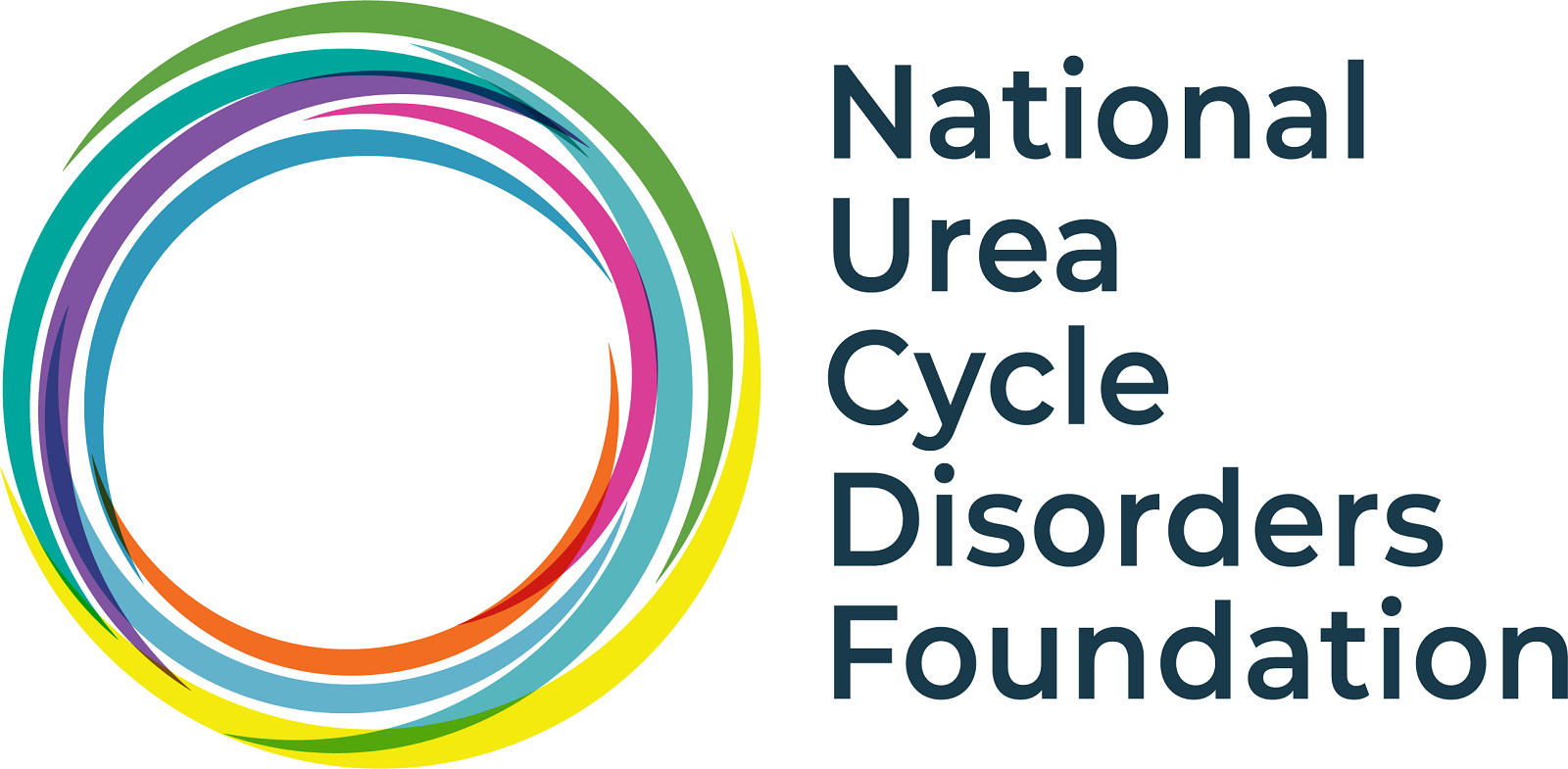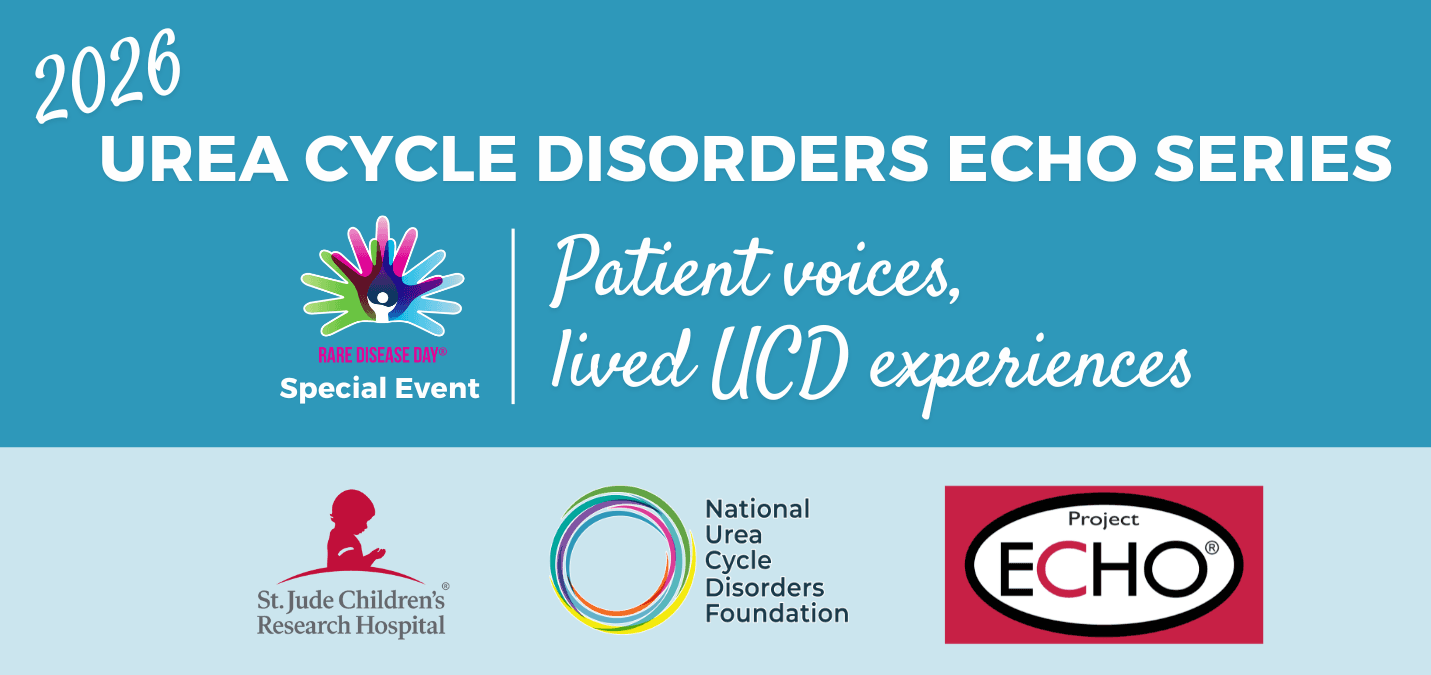2026 Urea Cycle Disorders ECHO Series
NUCDF is pleased in 2026 to once again host the Urea Cycle Disorders ECHO® Series, a free, virtual education program for clinicians, in partnership with Project ECHO®. This series will focus on improving the recognition, diagnosis and treatment of urea cycle disorders (UCDs), a group of eight rare genetic metabolic disorders that impair the body’s ability to remove ammonia from the bloodstream.
Rare Disease Day Special Event:
"Patient voices, lived UCD experiences"
Moderated by Dr. Andrea Gropman of the Pediatric Translational Neuroscience Initiative at St. Jude Children’s Research Hospital. Dr. Gropman is also the co-principal investigator of the NIH-funded Urea Cycle Disorders Consortium (UCDC), NUCDF’s research partner. Learning objectives included:
- Highlighting the importance of the patient voice and perspective in care
- Understanding the experience and impact of an infant-onset diagnosis
- Exploring the diagnostic odyssey experience
- Discussing considerations in treatment decision-making.
The following patients and caregivers will be sharing their stories at the session:
- Neonatal onset: Lori Shockey, caregiver, citrullinemia
- Young adult: Regan Dunnegan, OTC
- Diagnostic odyssey: Danielle Brown, patient and caregiver, OTC
Information on additional events in the 2026 series will be announced as plans are finalized.
2025 Urea Cycle Disorders ECHO Series: The Essentials
In 2025, NUCDF was pleased to host a new educational series for clinicians, “Urea Cycle Disorders ECHO: The Essentials,” in partnership with Project ECHO®.
The four 2025 session sessions focused on recognition, diagnosis, and treatment of urea cycle disorders (UCDs), a group of eight rare genetic metabolic disorders. The goal of the series was to share essential information with frontline caregivers who may not encounter these disorders often, including emergency room physicians, nurse practitioners, pediatricians, and neurologists as well as medical students. Downloadable presentations and session recordings from the 2025 series are available here:
Session 1: Recognition and Testing
Our first ECHO session took place on April 29, 2025 and featured Lindsay Burrage, MD, PhD of Baylor College of Medicine. More than 30 healthcare professionals joined this first session. Access a recording and download the Session 1 slides below.
The session's learning objectives included:
- Recognize symptoms of hyperammonemia in children and adults
- Discuss the challenges of recognizing urea cycle disorders
- Review standard collection and processing of ammonia levels
- Discuss testing strategies for diagnosing urea cycle disorders
Session 2: Diagnosis and Treatment
Our second ECHO session, Diagnosis and Treatment, took place on July 1, 2025 and featured Sandesh Nagamani, MD, of Baylor College of Medicine and Andrea Gropman, MD, of St. Jude Children's Research Hospital. Watch the Session 2 recording and download the slides below.
The session's learning objectives included:
- Diagnosis of UCDs
- Overview of UCDs
- Review clinical presentations of UCDs (clinical diagnosis)
- Review biochemical features (biochemical diagnosis)
- Review practical aspects of genetic testing (molecular diagnosis)
- Treatment of UCDs
- General principles of acute hyperammonemia
- General principles of long-term treatment
- Emerging therapies
Session 3: The Importance of Diet
Our third ECHO session, The Importance of Diet, took place on September 16, 2025 and featured Nicholas Ah Mew, MD and Erin MacLeod, PhD, RD, LD, of Children's National Hospital. Watch the Session 3 recording and download the slides below.
The session's learning objectives included:
- Understand primary principles of chronic UCD management
- Identify differences in management strategies for severe vs mild UCD cases
- Recognize differences in management between different UCD diagnoses
Session 4: Long-term management
Our fourth ECHO session, Long-term Management, took place on November 11, 2025 and featured Laura Konczal, MD, of University Hospitals Cleveland Medical Center. See below for the session slides and recording.
The session's learning objectives included:
- Review timeline of urea cycle and UCD discovery to current therapies
- Discuss current treatment options (acute and chronic management)
- Focus on liver transplantation
- Review limitations of current treatment options
- Discuss up and coming novel treatment options for UCD’s pending approval or in
- clinical trials
- Future therapies in pre-clinical phase
Additional resources
- Information and downloadable resources on high ammonia symptoms and testing are available at our CheckAmmonia campaign website: https://checkammonia.com
- The American College of Medical Genetics offers useful resources to help inform clinical decision making here: ACT Sheets and Algorithms.
About the series The Urea Cycle Disorders ECHO program is offered by the National Urea Cycle Disorders Foundation (NUCDF), a nonprofit patient group that advocates for people affected by UCDs. Since 1988, we have been working to advance research, improve care, and raise awareness that saves lives. Our partners in this effort are the experts of the Urea Cycle Disorders Consortium (UCDC), an NIH-funded group of researchers and clinicians across 16 academic institutions in the U.S., Canada, and Europe. For more information, contact NUCDF at info@nucdf.org.
Project ECHO (Extension for Community Healthcare Outcomes) is an innovative tele-mentoring program designed to create virtual communities of learners by bringing together healthcare providers and subject matter experts using videoconference technology, brief lecture presentations, and case-based learning, fostering an “all learn, all teach” approach and democratization of knowledge. Learn more.
About the disorders UCDs are caused by genetic mutations that lead to deficiencies in enzymes or transporters crucial to removing ammonia, a toxic byproduct of protein metabolism, from the bloodstream. The disorders can present shortly after birth or later in life. The specific mutation and degree of enzymatic function determine the onset and severity of UCDs. Less severe UCDs can be managed with a complex daily regimen of medication, low-protein diet, and nutritional supplementation, but cognitive impairment can still occur. Liver transplantation can be curative for some patients but brings new challenges and complications. New genetic therapies and mRNA treatments are being developed. Learn more.


